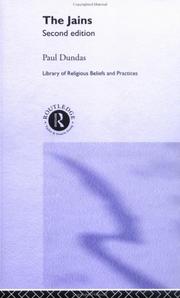| Listing 1 - 10 of 13 | << page >> |
Sort by
|

ISBN: 9789004157699 9004157697 9786611926557 1281926558 9047423003 9789047423003 Year: 2008 Volume: 93 Publisher: Leiden ; Boston : Brill,
Abstract | Keywords | Export | Availability | Bookmark
 Loading...
Loading...Choose an application
- Reference Manager
- EndNote
- RefWorks (Direct export to RefWorks)
This volume comprises an analysis of 112 divine epithets occurring in the alphabetic cuneiform texts from Ras Shamra and Ras Ibn Hani. It is intended to encompass all the epithets of the individual Ugaritic deities, semi-divine, and demonic beings, both good and evil, attested in the published texts. The epithets are profound expressions of the religious views of the ancient Ugaritians and their comprehension is essential for understanding the role, character, and status of the various deities in the Ugaritic pantheon. Particular attention has been paid to parallel divine epithets in Akkadian, biblical Hebrew, and classical Arabic.
Ugaritic language --- Gods, Ugaritic. --- Ougaritique (Langue) --- Dieux ougaritiques --- Epithets. --- Epithètes --- Gods, Ugaritic --- Epithets --- Epithètes --- Ugaritic gods --- Semitic languages, Northwest --- Epitheta --- Goden. --- Oegaritisch. --- Oegarit. --- Ugaritic language - Epithets
Book
ISBN: 1443869058 9781443869058 1322304645 9781322304649 1443859737 9781443859738 Year: 2014 Publisher: Newcastle upon Tyne, England : Cambridge Scholars Publishing,
Abstract | Keywords | Export | Availability | Bookmark
 Loading...
Loading...Choose an application
- Reference Manager
- EndNote
- RefWorks (Direct export to RefWorks)
If it is true that when we use a name, it must be the name of something, what is it that we name when we use terms such as Sherlock Holmes, Odysseus, and many of the same type? What is it we are addressing and how do the referential relations work assuming that we are thinking or talking about something when we use these terms? Otherwise, if we are speaking about nothing when we use a fictional name, how do we understand the linguistic process which gives us the impression of speaking about something? This book develops a critical study of some theories which deny any ontological existence to
Names --- Nomenclature --- Proper names --- Terminology --- Epithets --- Language and languages --- Philosophy. --- Etymology
Book
ISBN: 9781443883887 1443883883 9781443876193 1443876194 Year: 2015 Publisher: Newcastle upon Tyne, England : Cambridge Scholars Publishing,
Abstract | Keywords | Export | Availability | Bookmark
 Loading...
Loading...Choose an application
- Reference Manager
- EndNote
- RefWorks (Direct export to RefWorks)
This book is one of the first extensive cross-linguistic theoretical investigations on epithets. Epithets (such as "the bastard") are anaphoric expressions which take the shape of a definite description, contain an evaluative component, and are typically unstressed. This monograph shows that, in order to understand the perplexing nature of epithets, one must consider what kinds of behavior they exhibit in different components of the language faculty. In this vein, the text adopts a broad approach, analysing epithets from the perspective of the syntax-semantics-pragmatics interface.The empirica
Epithets. --- Grammar, Comparative and general --- Semantics. --- Formal semantics --- Semasiology --- Semiology (Semantics) --- Comparative linguistics --- Information theory --- Language and languages --- Lexicology --- Meaning (Psychology) --- Syntax --- English language --- Names --- Nicknames --- Syntax. --- Epithets --- Linguistics --- Philology --- Grammar, Comparative and general Syntax
Book
ISBN: 1622734017 1622735579 9781622735570 9781622734016 Year: 2019 Publisher: Wilmington, Delaware : Vernon Press,
Abstract | Keywords | Export | Availability | Bookmark
 Loading...
Loading...Choose an application
- Reference Manager
- EndNote
- RefWorks (Direct export to RefWorks)
Onomastics. --- Names --- Religious aspects. --- Nomenclature --- Proper names --- Terminology --- Epithets --- Language and languages --- Onomatology --- Onomasiology --- Names, Personal --- Etymology
Periodical
ISSN: 00277738 17562279 Year: 1953 Publisher: DeKalb (Ill.): Geneseo (N.Y.): Northern Illinois University Press, State university of New York college at Geneseo,
Abstract | Keywords | Export | Availability | Bookmark
 Loading...
Loading...Choose an application
- Reference Manager
- EndNote
- RefWorks (Direct export to RefWorks)
"Journal of the American Name Society."
Semiotics --- Names --- Onomastics --- Noms --- Onomastique --- Periodicals. --- Périodiques --- Names. --- Naamkunde. --- Periodicals --- Nomenclature --- Proper names --- Terminology --- Epithets --- Language and languages --- Etymology --- Onomastics. --- Onomatology --- Onomasiology --- Names, Personal --- Arts and Humanities --- Language & Linguistics --- Names - Periodicals.

ISBN: 1281164577 9786611164577 0191534420 1435622839 9780191534423 9780199274420 0199274428 9780199226528 0199226520 1383041725 9781281164575 661116457X 9781435622838 Year: 2007 Publisher: Oxford : Oxford University Press,
Abstract | Keywords | Export | Availability | Bookmark
 Loading...
Loading...Choose an application
- Reference Manager
- EndNote
- RefWorks (Direct export to RefWorks)
Wolfram Hinzen's pioneering text lays new foundations for the study of reference and truth. It explores truth in the light of Noam Chomsky's Minimalist Program and argues that truth is a function of the human mind. It sets out an internalist reconstruction of meaning and explores its outcomes in thought language and thought.
Language and languages --- Truth. --- Thought and thinking. --- Names. --- Mind --- Thinking --- Thoughts --- Educational psychology --- Philosophy --- Psychology --- Intellect --- Logic --- Perception --- Psycholinguistics --- Self --- Conviction --- Belief and doubt --- Skepticism --- Certainty --- Necessity (Philosophy) --- Pragmatism --- Nomenclature --- Proper names --- Terminology --- Epithets --- Philosophy. --- Etymology
Book
ISBN: 1501500228 1614512361 9781614512363 9781501500220 9781614512936 1614512930 Year: 2015 Publisher: Boston : De Gruyter,
Abstract | Keywords | Export | Availability | Bookmark
 Loading...
Loading...Choose an application
- Reference Manager
- EndNote
- RefWorks (Direct export to RefWorks)
"This book investigates the issue of the singularity versus the multiplicity of ancient Near Eastern deities who are known by a common first name but differentiated by their last names, or geographic epithets. It focuses primarily on the Ishtar divine names in Mesopotamia, Baal names in the Levant, and Yahweh names in Israel"--
God --- God (Judaism) --- Elohim --- Jehovah --- Yahveh --- Yahweh --- Yehovah --- Yhwh --- Metaphysics --- Misotheism --- Theism --- Name --- Name. --- Ishtar (Assyro-Babylonian deity) --- Baal --- Baal Shamen --- Baal Shemin --- Bel --- Baal (Canaanite deity) --- Ishtar --- Ištar --- Inanna --- Astarte --- Gods, Canaanite --- Ancient Near Eastern deities. --- Divine epithets.

ISBN: 041526605X 0415266068 1134501668 1280068957 0203398270 9780203398272 9780415266055 9780415266062 9781134501663 9781280068959 9781134501618 9781134501656 113450165X 1003572340 Year: 2002 Publisher: London ; New York : Routledge,
Abstract | Keywords | Export | Availability | Bookmark
 Loading...
Loading...Choose an application
- Reference Manager
- EndNote
- RefWorks (Direct export to RefWorks)
The Indian religion of Jainism, whose central tenet involves non-violence to all creatures, is one of the world's oldest and least-understood faiths. Dundas looks at Jainism in its social and doctrinal context, explaining its history, sects, scriptures and ritual, and describing how the Jains have, over 2500 years, defined themselves as a unique religious community. This revised and expanded edition takes account of new research into Jainism.
Jainism. --- Jains. --- #SBIB:39A10 --- Antropologie: religie, riten, magie, hekserij --- Jainism --- Jains --- Jainas --- Religious adherents --- Religions --- Jain identity --- the Vedic period --- world renunciation --- the Seers --- the fordmakers --- the ford --- Mahavira --- Epithets --- ascetiscism --- Makkhali Gosala --- Parsva --- enlightenment --- the ganadharas --- Digambaras --- Svetambaras --- scriptures --- doctrine --- loka --- karma --- Jain relativism --- Hinduism --- Buddhism
Book
ISBN: 9780299233648 0299233642 9780299233631 0299233634 1282424203 9786612424205 9781282424203 6612424206 Year: 2009 Publisher: Madison, WI : University of Wisconsin Press,
Abstract | Keywords | Export | Availability | Bookmark
 Loading...
Loading...Choose an application
- Reference Manager
- EndNote
- RefWorks (Direct export to RefWorks)
What's in a name? As Osumaka Likaka argues in this illuminating study, the names that Congolese villagers gave to European colonizers reveal much about how Africans experienced and reacted to colonialism. The arrival of explorers, missionaries, administrators, and company agents allowed Africans to observe Westerners' physical appearances, behavior, and cultural practices at close range--often resulting in subtle yet trenchant critiques. By naming Europeans, Africans turned a universal practice into a local mnemonic system, recording and preserving the village's understanding of colonialism in the form of pithy verbal expressions that were easy to remember and transmit across localities, regions, and generations.
Kongo language --- Nicknames --- Kongo (Langue) --- Sobriquets --- Epithets. --- History. --- Epithètes --- Histoire --- Congo (Brazzaville) --- Congo (Democratic Republic) --- Congo --- Congo (République démocratique) --- Colonization. --- Colonisation --- History & Archaeology --- Regions & Countries - Africa --- Epithets --- History --- Congo (Kinshasa) --- 967.5.03 --- 967.5.03 Geschiedenis van Zaïre (Kongo): Koloniale periode; Belgisch Kongo--(1884-1960) --- Geschiedenis van Zaïre (Kongo): Koloniale periode; Belgisch Kongo--(1884-1960) --- Congo belge --- --Congo Brazzaville --- --Épithète --- --Surnom --- --Histoire --- --Mémoire collective --- --Epithets --- Colonization --- Epithètes --- Congo (République démocratique) --- Soubriquets --- Congo language --- Fiote language --- Kikongo language --- Congo (Leopoldville) --- République du Congo (Leopoldville) --- Republic of the Congo (Leopoldville) --- Republic of Congo (Leopoldville) --- République démocratique du Congo --- Democratic Republic of the Congo --- Demokraticheskai︠a︡ Respublika Kongo --- Kongo --- RDC (République démocratique du Congo) --- DRC (Democratic Republic of the Congo) --- DRK (Demokraticheskai︠a︡ Respublika Kongo) --- Democratic Republic of Congo --- DR Congo --- RD Congo --- République populaire du Congo --- Kongo (Brazzaville) --- République du Congo (Brazzaville) --- Republic of the Congo (Brazzaville) --- Republic of Congo (Brazzaville) --- Congo (People's Republic) --- Ludowa Republika Konga --- Narodnai︠a︡ Respublika Kongo --- R.P.C. (République populaire du Congo) --- RPC --- People's Republic of the Congo --- Congo Republic (Brazzaville) --- Names, Personal --- Bantu languages --- Belgian Congo --- Zaire --- Middle Congo --- Repubilika ya Kôngo --- Republíki ya Kongó --- West Congo --- ROC (Republic of Congo) --- Congo DR --- R.D. Congo --- History of Africa --- History of Congo --- anno 1800-1999 --- Congo-Brazzaville --- Kongo language - Epithets --- Nicknames - Congo (Brazzaville) - History --- Nicknames - Congo (Kinshasa) - History --- Épithète --- Surnom --- Mémoire collective --- Congo Brazzaville --- Congo (Brazzaville) - Colonization --- Congo (Kinshasa) - Colonization
Book
ISBN: 9789027257772 9027257779 9789027269560 9027269564 133620267X Year: 2015 Volume: 1 Publisher: Amsterdam ; Philadelphia : John Benjamins Publishing Company,
Abstract | Keywords | Export | Availability | Bookmark
 Loading...
Loading...Choose an application
- Reference Manager
- EndNote
- RefWorks (Direct export to RefWorks)
Terminology has started to explore unbeaten paths since Wüster, and has nowadays grown into a multi-facetted science, which seems to have reached adulthood, thanks to integrating multiple contributions not only from different linguistic schools, including computer, corpus, variational, socio-cognitive and socio-communicative linguistics, and frame-based semantics, but also from engineering and formal language developers. In this ever changing and diverse context, Terminology offers a wide range of opportunities ranging from standardized and prescriptive to prototype and user-based approaches. At this point of its road map, Terminology can nowadays claim to offer user-based and user-oriented, hence user-friendly, approaches to terminological phenomenona, when searching, extracting and analysing relevant terminology in online corpora, when building term bases that contribute to efficient communication among domain experts in languages for special purposes, or even when proposing terms and definitions formed on the basis of a generally agreed consensus in international standard bodies. Terminology is now ready to advance further, thanks to the integration of meaning description taking into account dynamic natural language phenomena, and of consensus-based terminology management in order to help experts communicate in their domain-specific languages. In this Handbook of Terminology (HoT), the symbiosis of Terminology with Linguistics allows a mature and multi-dimensional reflection on terminological phenomena, which will eventually generate future applications which have not been tested yet in natural language. The HoT aims at disseminating knowledge about terminology (management) and at providing easy access to a large range of topics, traditions, best practices, and methods to a broad audience: students, researchers, professionals and lecturers in Terminology, scholars and experts from other disciplines (among which linguistics, life sciences, metrology, chemistry, law studies, machine engineering, and actually any expert domain). In addition, the HoT addresses any of those with a professional or personal interest in (multilingual) terminology, translation, interpreting, localization, editing, etc., such as communication specialists, translators, scientists, editors, public servants, brand managers, engineers, (intercultural) organization specialists, and experts in any field.
Lexicology. Semantics --- Language and languages --- Terminology --- #KVHA:Terminologie --- Foreign languages --- Languages --- Anthropology --- Communication --- Ethnology --- Information theory --- Meaning (Psychology) --- Philology --- Linguistics --- Terminologie. --- Terminologieleer. --- Terminology. --- Handbooks, manuals, etc. --- Names --- Terms and phrases --- Sublanguage --- Allusions --- Nomenclature --- Proper names --- Epithets --- Etymology --- Language and languages. --- Names. --- Terms and phrases. --- Language and languages - Terminology --- Terminology - Handbooks, manuals, etc.
| Listing 1 - 10 of 13 | << page >> |
Sort by
|

 Search
Search Feedback
Feedback About UniCat
About UniCat  Help
Help News
News